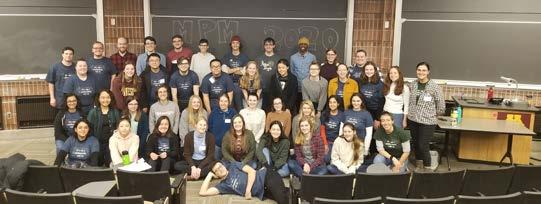
4 minute read
Symposia
from 2020 UMN Mathematics Newsletter
by College of Science and Engineering at the University of Minnesota
DON ARONSON SYMPOSIUM
Fadil Santosa, Vladmir Sverak and Peter Olver co-organized a meeting in memory of our colleague Emeritus Professor Don Aronson, held at the University of Minnesota on November 1-2, 2019. The meeting was initially designed to commemorate Don’s life and contributions to mathematics, and thereby celebrate 70 years of analysis at the University of Minnesota. After Don’s untimely death, the meeting included a Memorial in the Math Library on the Friday afternoon after the talks ended, with Don’s family, friends and colleagues in attendance. The distinguished speakers at the meeting were, in order of appearance, Luis Caffarelli, University of Texas, Svitlana Mayboroda, University of Minnesota, Fanghua Lin, Courant Institute, John Mallet-Paret, Brown University, Nancy Kopell, Boston University, Sigurd Angenent, University of Wisconsin. Talks were uniformly excellent. The participants and guests greatly benefited from the talks and social interactions, and the opportunity to celebrate Don’s long and distinguished career at the University of Minnesota.
ORDWAY VISITOR
Professor Arnoldo Frigessi (University of Oslo) was a 1-week Ordway visitor at the School of Mathematics from December 1st to December 8th, 2019. He gave talks and did research on computational modeling approaches to oncology and machine learning during his visit. Dr. Frigessi’s research interests are in data science and statistics - including particular focus areas Markov Chain Monte Carlo and Bayesian inference, personalized medicine and mechanistic cancer modeling. He is the director of the Oslo Center for Biostatistics and Epidemiology, and also the director of the Oslo data science institute, BigInsight. He is a member of the Royal Norwegian Academy of Sciences and Letters and Norwegian Academy of Technological Sciences.
Don Aronson Memorial Conference Reception
2019 RIVIÈRE-FABES SYMPOSIUM
The 2019 annual Rivière-Fabes Symposium was held from April 12-14, 2019. Distinguished speakers included: Guy David, Jonathan Luk, Eugenia Malinnikova and Juncheng Wei. Some of the main topics discussed this year at the symposium included: Elliptic measure with a lower dimensional boundary, The strong cosmic censorship conjecture in general relativity, Two questions of Landis and their applications, and On Gluing Method I: Type II Blow-up for Fujita Equation in Matano-Merle Regime, On Gluing Method II: Second Order Estimates of Allen-Cahn Equation.
A conference on Multiscale Mathematical Modeling of Biological Phenomena was held on May 20-22, 2019 at the School of Mathematics. The conference centered around topics influenced by the contributions of Hans Othmer, and brought together mathematical biologists from all over the world specializing in multiscale modeling techniques. Biological applications ranged from signal transduction, cell polarization and cell movement to tissue organization, development and cancer. Conference organizers include: Jasmine Foo, Yoichiro Mori, and Duane Nykamp; it was supported in part by the Institute for Mathematics and its Applications (IMA) through its Participating Institution (PI) Program. More detail, including speaker abstracts can be found at https://sites.google.com/umn.edu/mmbio/schedule .
THE MATHEMATICS PROJECT AT MINNESOTA (MPM)

The Mathematics Project at Minnesota (MPM) is an annual fourday workshop for undergraduates at the University of Minnesota who come from underrepresented groups in mathematics. Current graduate students organize MPM. Each year right before spring semester starts MPM engages students in academic activities, career building, diversity and inclusion, and community building. Highlights of the program in January of 2020 included excellent
RETIREMENTS
Professor Chester Miracle retired in June 2019 after sixty years of service to the University (having joined the university in 1959). To quote from Professor Olver’s introductory comments to the 2019 Math Newsletter, “Chester (was) the last remaining member of the old College of Liberal Arts Math Department, which was merged into the current CSE Department in the mid 1960’s, and is much valued for his many years of stellar teaching and curriculum development. His longstanding presence in the Department will be missed, but we wish him many more productive years of Emeritus status.” Indeed, Chester received the Outstanding Professor Award from the College of Science and Engineering on more than one occasion, having been a kind and generous yet demanding teacher. As a long-standing member of the curriculum committee he played a major role in the selection of textbooks and his judgment was highly valued. Above all, Chester was demanding of himself and always strove to improve and augment presentations in standard
2020 MPM attendees and mentors
individual project presentations given by participants. McCleary Philbin, one of the organizers of MPM 2020 said, “This year was great, because we had our largest and most diverse group of participants yet.” One of the 2020 attendees remarked on the experience, “MPM was a great opportunity for me to make new friends while also becoming more confident in myself and my mathematical abilities.”
texts, producing numerous sets of lecture notes for practically all the lower division courses.
Chester taught the first course ever on closed circuit television at the University of Minnesota, and for several decades he was the coordinator of correspondence, night school and summer classes. Chester found it especially rewarding to help and advise adult students who were working hard at a day job while completing a math degree. He continued as night school coordinator until about ten years ago when the School of Mathematics programs underwent a consolidation and reorganization. For many years, Chester contributed in a major way as coordinator of the IT/CSE Calculus sequence. Chester’s skills as a teacher include a remarkable ability to command students’ attention as well as a wry sense of humor. He knew the right moment to lighten up the lecture and is an excellent raconteur. His anecdotes often draw on his remarkable upbringing in the Appalachian Mountains of eastern Kentucky and the almost proverbial hard-scrabble existence that many of us associate with that region. He has, on occasion, enlivened us, by sharing some of his colorful experiences during a mail room conversation, where he would be the center of attention of several colleagues. We wish Chester all the best in retirement.









